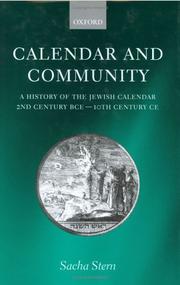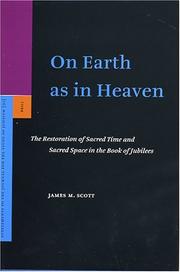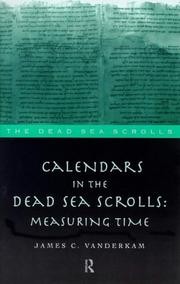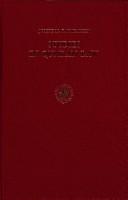| Listing 1 - 10 of 16 | << page >> |
Sort by
|
Book
ISBN: 900425966X 9789004259669 9789004259652 9004259651 Year: 2014 Publisher: Leiden Boston
Abstract | Keywords | Export | Availability | Bookmark
 Loading...
Loading...Choose an application
- Reference Manager
- EndNote
- RefWorks (Direct export to RefWorks)
The study of time, astronomy, and calendars, has been closely intertwined in the history of Western culture and, more particularly, Jewish tradition. Jewish interest in astronomy was fostered by the Jewish calendar, which was based on the courses of the sun and the moon, whilst astronomy, in turn, led to a better understanding of how time should be reckoned. Time, Astronomy, and Calendars in the Jewish Tradition , edited by Sacha Stern and Charles Burnett, presents a wide selection of original research in this multi-disciplinary field, ranging from Antiquity to the later Middle Ages. Its variety of approaches and sub-themes reflects the relevance of astronomy and calendars to many aspects of Jewish, and more generally ancient and medieval, culture and social history. Contributors include: Jonathan Ben-Dov, Reimund Leicht, Marina Rustow, Francois de Blois, Raymond Mercier, Philipp Nothaft, Josefina Rodriguez Arribas, Ilana Wartenberg, Israel Sandman, Justine Isserles, Anne C. Kineret Sittig, Katharina Keim, and Sacha Stern
Jewish calendar --- Jewish astronomy --- Jewish cosmology --- Cosmology, Jewish --- Cosmology --- Astronomy, Jewish --- Hebrew astronomy --- Astronomy --- Calendar, Hebrew --- Calendar, Jewish --- Hebrew calendar --- Calendar --- Jewish chronology --- History

ISBN: 0198270348 019160075X 1281943754 0191520780 9786611943752 9780198270348 Year: 2001 Publisher: Oxford : Oxford university press,
Abstract | Keywords | Export | Availability | Bookmark
 Loading...
Loading...Choose an application
- Reference Manager
- EndNote
- RefWorks (Direct export to RefWorks)
Jewish calendar --- History. --- 930.24 <33> --- Calendar, Hebrew --- Calendar, Jewish --- Hebrew calendar --- Calendar --- Jewish chronology --- 930.24 <33> Historische chronologie--Oud-Palestina. Judea --- Historische chronologie--Oud-Palestina. Judea --- History
Book
ISBN: 9780674052543 Year: 2011 Publisher: Cambridge, MA ; London The Belknap Press of Harvard University Press
Abstract | Keywords | Export | Availability | Bookmark
 Loading...
Loading...Choose an application
- Reference Manager
- EndNote
- RefWorks (Direct export to RefWorks)
Christianity and other religions --- Jewish calendar --- Judaism --- Time --- Hours (Time) --- Geodetic astronomy --- Nautical astronomy --- Horology --- Jews --- Religions --- Semites --- Calendar, Hebrew --- Calendar, Jewish --- Hebrew calendar --- Calendar --- Jewish chronology --- Relations&delete& --- Christianity --- History --- Religious aspects&delete& --- Religion --- Europe --- Ethnic relations. --- Relations --- Religious aspects --- Brotherhood Week
Book
ISBN: 9780830852628 083085262X 9780830865185 0830865187 Year: 2019 Publisher: Downers Grove, Illinois
Abstract | Keywords | Export | Availability | Bookmark
 Loading...
Loading...Choose an application
- Reference Manager
- EndNote
- RefWorks (Direct export to RefWorks)
"How were holidays scheduled and taught in biblical Israel, and what did they have to do with the creation narrative? Michael LeFebvre considers the calendars of the Pentateuch, arguing that dates were added to Old Testament narratives not as journalistic details but to teach sacred rhythms of labor and worship. LeFebvre then applies this insight to the creation week, finding that the days of creation also serve a liturgical purpose"--
Jewish calendar --- 296*513 --- 296*513 Joodse kalender --- Joodse kalender --- Calendar, Hebrew --- Calendar, Jewish --- Hebrew calendar --- Calendar --- Jewish chronology --- History --- Bible. --- Antico Testamento --- Hebrew Bible --- Hebrew Scriptures --- Kitve-ḳodesh --- Miḳra --- Old Testament --- Palaia Diathēkē --- Pentateuch, Prophets, and Hagiographa --- Sean-Tiomna --- Stary Testament --- Tanakh --- Tawrāt --- Torah, Neviʼim, Ketuvim --- Torah, Neviʼim u-Khetuvim --- Velho Testamento --- Criticism, interpretation, etc. --- History.

ISBN: 9004137963 9786610859481 1429426969 9047405110 1280859482 1433704536 9781429426961 9789004137967 9781433704536 9789047405115 Year: 2005 Volume: 91 Publisher: Leiden Boston Brill
Abstract | Keywords | Export | Availability | Bookmark
 Loading...
Loading...Choose an application
- Reference Manager
- EndNote
- RefWorks (Direct export to RefWorks)
This volume deals with the chronological and spatial conceptions underlying the Book of Jubilees, a Jewish apocalyptic writing of the mid-second century BCE, and shows how in these respects Jubilees forms a bridge between the earlier Enochic tradition and the later Qumran sectarian writings. The book argues essentially that for Jubilees, the consummation of the ages will effect the restoration of sacred space and sacred time, so that all things correspond to God's original will for the creation on earth as in heaven. This book has important implications not only for the study of Jubilees itself and other Jewish writings of the Second Temple period, but also for research on early Christian chiliasm.
Calendar [Hebrew] --- Calendar [Jewish ] --- Calendrier hébreu --- Calendrier juif --- Chronologie [Joodse ] --- Chronologie hébraique --- Chronologie juive --- Chronology [Hebrew] --- Chronology [Jewish] --- Hebreeuwse chronologie --- Hebreeuwse kalender --- Hebrew chronology --- Heilige plaatsen --- Holy places --- Jewish calendar --- Jewish chronology --- Joodse chronologie --- Joodse kalender --- Kalender [Hebreeuwse ] --- Kalender [Joodse ] --- Lieux sacrés --- Plaatsen [Heilige ] --- Places [Sacred ] --- Sacred places --- Sacred space --- Sacred spaces --- Space [Sacred ] --- Spaces [Sacred ] --- 229*202 --- Boek der Jubileeën --- 229*202 Boek der Jubileeën --- Calendrier hébraïque --- Calendrier israélite --- Hebrew calendar --- Juifs -- Calendrier --- Time --- Hours (Time) --- Geodetic astronomy --- Nautical astronomy --- Horology --- Places, Sacred --- Sacred sites --- Sites, Sacred --- Space, Sacred --- Holy, The --- Religion and geography --- Chronology, Jewish --- Chronology --- Jews --- Calendar, Hebrew --- Calendar, Jewish --- Calendar --- Religious aspects&delete& --- Judaism --- History --- Book of Jubilees --- Bible. --- Little Genesis --- Jubilees --- Livre des Jubilés --- Petite Genèse --- Buch der Jubiläen --- Kleine Genesis --- Liber Jubilaeorum --- Parva Genesis --- Jubiläenbuch --- Sefer ha-Yovlim --- Criticism, interpretation, etc. --- Palestine --- In Judaism. --- Criticism, interpretation, etc --- Religious aspects --- Jewish calendar. --- Jewish chronology. --- Sacred space. --- Judaism. --- Palestine in Judaism.

Abstract | Keywords | Export | Availability | Bookmark
 Loading...
Loading...Choose an application
- Reference Manager
- EndNote
- RefWorks (Direct export to RefWorks)
Calendar [Hebrew] --- Calendar [Jewish ] --- Calendrier hébraïque --- Calendrier hébreu --- Calendrier israélite --- Calendrier juif --- Chronologie [Joodse ] --- Chronologie hébraique --- Chronologie juive --- Chronology [Hebrew] --- Chronology [Jewish] --- Hebreeuwse chronologie --- Hebreeuwse kalender --- Hebrew calendar --- Hebrew chronology --- Jewish calendar --- Jewish chronology --- Joodse chronologie --- Joodse kalender --- Juifs -- Calendrier --- Kalender [Hebreeuwse ] --- Kalender [Joodse ] --- 930.24 --- 930.24 Historische chronologie --- Historische chronologie --- Dead Sea scrolls --- Criticism, interpretation, etc. --- Chronology, Jewish --- Chronology --- Jews --- Calendar, Hebrew --- Calendar, Jewish --- Calendar --- History --- Dead Sea scrolls. --- Jerusalem scrolls --- ʻAin Fashka scrolls --- Jericho scrolls --- Scrolls, Dead Sea --- Qumrân scrolls --- Rękopisy z Qumran --- Shikai bunsho --- Megilot Midbar Yehudah --- Dodezee-rollen --- Kumránské rukopisy --- Documentos de Qumrán --- Textos de Qumrán --- Rollos del Mar Muerto --- Manuscritos del Mar Muerto --- Manuscrits de la mer Morte --- Dödahavsrullarna --- Kumranin kirjoitukset --- Kuolleenmeren kirjoitukset --- Qumranhandskrifterna --- Qumranin kirjoitukset --- Qumran Caves scrolls --- Dead Sea Scrolls --- Criticism, interpretation, etc

ISBN: 9004053948 9789004053946 9789004667471 9004667474 Year: 1977 Volume: v. 24 Publisher: Leiden ;Boston Brill
Abstract | Keywords | Export | Availability | Bookmark
 Loading...
Loading...Choose an application
- Reference Manager
- EndNote
- RefWorks (Direct export to RefWorks)
Qumran community --- Jewish calendar --- Communauté de Qumran --- Droit juif --- Calendrier juif --- 229*316.2 --- -Jewish law --- -Calendar, Jewish --- -#GROL:SEMI-229*3 --- Calendar, Hebrew --- Calendar, Jewish --- Hebrew calendar --- Jewish chronology --- Kumran community --- Jewish sects --- Essenes --- Qumran-secte en Essenen --- Qumran community. --- Jewish calendar. --- 229*316.2 Qumran-secte en Essenen --- Communauté de Qumrān --- Jewish law --- #GROL:SEMI-229*3 --- Calendar --- History --- Qumran --- History. --- Histoire
Book
ISBN: 9004284060 9004284052 1322309930 Year: 2015 Publisher: Leiden, Netherlands : Brill,
Abstract | Keywords | Export | Availability | Bookmark
 Loading...
Loading...Choose an application
- Reference Manager
- EndNote
- RefWorks (Direct export to RefWorks)
The ancient mathematical basis of the Aramaic calendars in the Dead Sea Scrolls is analysed in this investigation. Helen R. Jacobus re-examines an Aramaic zodiac calendar with a thunder divination text (4Q318) and the calendar from the Aramaic Astronomical Book (4Q208 - 4Q209), all from Qumran. Jacobus demonstrates that 4Q318 is an ancestor of the Jewish calendar today and that it helps us to understand 4Q208 - 4Q209. She argues that these calendars were taught in antiquity as angelic knowledge described in 1 Enoch and the Book of Jubilees . The study also encompasses Babylonian, Hellenistic, Byzantine astronomy and astrology, and classical and Jewish writings. Finally, a medieval Hebrew zodiac calendar related to 4Q318 with an astrological text is published here for the first time.
Jewish calendar. --- Jewish astronomy. --- Astronomy, Jewish --- Hebrew astronomy --- Astronomy --- Calendar, Hebrew --- Calendar, Jewish --- Hebrew calendar --- Calendar --- Jewish chronology --- Dead Sea scrolls. --- Jerusalem scrolls --- ʻAin Fashka scrolls --- Jericho scrolls --- Scrolls, Dead Sea --- Qumrân scrolls --- Rękopisy z Qumran --- Shikai bunsho --- Megilot Midbar Yehudah --- Dodezee-rollen --- Kumránské rukopisy --- Documentos de Qumrán --- Textos de Qumrán --- Rollos del Mar Muerto --- Manuscritos del Mar Muerto --- Manuscrits de la mer Morte --- Dödahavsrullarna --- Kumranin kirjoitukset --- Kuolleenmeren kirjoitukset --- Qumranhandskrifterna --- Qumranin kirjoitukset --- Qumran Caves scrolls
Book
ISBN: 3161509803 9783161509803 Year: 2012 Volume: 82 Publisher: Tübingen: Mohr Siebeck,
Abstract | Keywords | Export | Availability | Bookmark
 Loading...
Loading...Choose an application
- Reference Manager
- EndNote
- RefWorks (Direct export to RefWorks)
The festival calendars in the Pentateuch have made up the heart of critical biblical research from the beginning. Each of the calendars was thought to have taken shape against its own specific historical background and to accurately reflect a distinct stage in the development of Israel's cultic and social institutions. Classical hypotheses used them to distinguish the different legal codes in the Pentateuch from each other, to define the original compositions, and to arrange them relative to each other in an historical, chronological sequence. Shimon Gesundheit challenges the classical historical reconstructions and the methodology driving them. He presents an alternate point of view, according to which the festival laws do not simplistically reflect the specific cultic or social realities of actual historical periods. Rather, through their legal discourse, they shape and promote new ideas by textual revision and redaction, in the lemmatic style of midrash, and they represent a process of progressive literary development.
Fasts and feasts in the Bible. --- Jewish calendar. --- Bible. --- Criticism, interpretation, etc. --- Fasts and feasts in the Bible --- Jewish calendar --- 221.08*4 --- Calendar, Hebrew --- Calendar, Jewish --- Hebrew calendar --- Calendar --- Jewish chronology --- Fasts and feasts --- Rites and ceremonies in the Bible --- 221.08*4 Theologie van het Oude Testament: cultus --- Theologie van het Oude Testament: cultus --- Judaism --- Chumash --- Five Books of Moses --- Ḥamishah ḥumshe Torah --- Ḥumash --- Kitāb-i Muqqadas --- Mose Ogyŏng (Book of the Old Testament) --- Pentateuch --- Pi︠a︡toknizhīe Moiseevo --- Sefer Ḥamishah ḥumshe Torah --- Tawrāh --- Torà (Pentateuch) --- Torah (Pentateuch) --- Tʻoris xutʻcigneuli --- Ureta --- תורה --- Haftarot
Book
ISBN: 9789004169630 9789004226326 900422632X 9004169636 9786613591180 1280495952 9781280495953 6613591181 Year: 2012 Publisher: Leiden BRILL
Abstract | Keywords | Export | Availability | Bookmark
 Loading...
Loading...Choose an application
- Reference Manager
- EndNote
- RefWorks (Direct export to RefWorks)
Starting from the seminal work of the French scholar Annie Jaubert on the date of the Last Supper, the present work revisits known - and identifies new - calendrical issues in the literature of Second Temple Judaism. The research supports the conclusion that all known calendrical traditions functioned on the tenet that orthopraxis in ancient Judaism meant close interconnection between cultic and agricultural cycles. From this perspective the book removes the calendrical objection leveled at the Jaubertian theory. Further, the research brings new light on current debates about Qumran calendrical documents and proposes the identification of a previously unknown calendrical polemic in the Astronomical Book of Enoch concerning the synchronization of the 364DY tradition with the lunar cycle.
Fasts and feasts --- Jewish calendar --- Judaism --- Lord's Supper --- 933.3 --- Hellenistic Judaism --- Judaism, Hellenistic --- Calendar, Hebrew --- Calendar, Jewish --- Hebrew calendar --- Calendar --- Jewish chronology --- Festivals --- Holidays --- Holidays, Jewish --- Jewish holidays --- Jews --- Fasts and feasts in the Bible --- 933.3 Geschiedenis van het Joodse volk: Tweede Tempelperiode--(538 v.Chr.-70 n.Chr.) --- Geschiedenis van het Joodse volk: Tweede Tempelperiode--(538 v.Chr.-70 n.Chr.) --- Communion --- Eucharist --- Holy Communion --- Sacrament of the Altar --- Blood --- Sacraments --- Sacred meals --- Last Supper --- Mass --- History --- Religious aspects --- Christianity --- Jaubert, Annie. --- Jewish calendar. --- Lord's Supper. --- Judaism.
| Listing 1 - 10 of 16 | << page >> |
Sort by
|

 Search
Search Feedback
Feedback About UniCat
About UniCat  Help
Help News
News